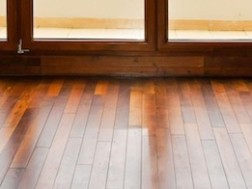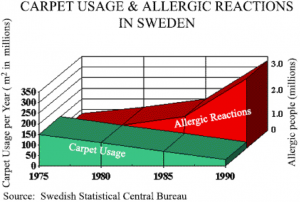Are Hardwood Floors Healthier Than Carpeted Floors?

There is an interesting study from Sweden
Apparently, in 1975, Sweden made a huge push to remove carpets in an effort to reduce allergens and allergies in the country.
Many blamed carpet as the culprit for many allergy sufferers. They said that carpet was often dirty and thus contributed to poor indoor air quality.
A document found on the Carpet and Rug Institute (CRI) website shows that nearly all carpets were removed from Swedish homes and facilities because of a nationwide scare of allergens.
http://www.carpet-health.org/pdf/PrevalenceAsthmaSwedPopul.pdf for that document.
Interesting is the fact that allergic reactions and other illnesses blamed on carpet in homes and facilities went up dramatically after carpet had been removed.
The following is a chart from the CRI website illustrating what happened in Sweden when carpets were removed.
Quite the opposite of what was expected when carpet was removed. Sweden has become a nation consuming less and less carpet, and at the same time, suffering more and more from what was originally blamed on carpet.
When you analyze and compare all living conditions in today’s world, carpet actually makes a healthier home or facility. You don’t have the dust load in the air as you do with hard floors – all things being equal, of course, and cleaned accordingly.
Dust mites and pet dander are often blamed for allergic reactions. Both can build up in carpet, and both can be found on hard floors. We won’t even go into tobacco smoke, pollution from automobiles, pollens, and more…
When in carpet, the proper vacuum system – used regularly – along with regular carpet cleaning, keeps allergen levels very low.
For hard floors, the proper dusting and mopping system is important. With just a small amount of air movement on a hard floor, allergens are swept up into the air and into the respiratory systems of occupants.
Potential carpet problem
Many people make the statement that carpet is a sink and thus traps and holds potentially dangerous contaminants.
That’s a true statement, but it’s also a good quality of carpet.
With carpet, the fibers act as a filter and hold onto contaminants until they can be vacuumed or cleaned. Hard floors do not do that.
One way to see this for yourself is to watch the air in a home when the sun is shining into the home. With clean, carpeted surfaces, you see some dust in the air, but not much.
In a home with hard floors, you see more dust because there is less surface in the home that holds onto dust.
So you have two options:
Option #1: Have carpet in the home hold onto contaminants, keeping them away from your breathing space, and remove these contaminants with regular vacuuming…
Option #2: Have hard floors in the home, which do not hold contaminants but instead allows them to “hang out” in the air, thus possibly triggering allergen reaction from occupants…
Besides being healthier for occupants, carpet also makes a safer home or facility. There are less trip and fall accidents on carpeted surfaces, and if something is spilled, less of a chance of slipping.
Carpet and mold!
Can mold grow on carpet? Yes. Can mold grow on just about any surface? Yes.
Mold needs a food source, moisture, a warm temperature and typically a dark place to reside.
Mold does not use carpet as a food source. Today’s carpets, the vast majority, are made from synthetic materials.
Mold has no appetite for these materials.Mold, however, will “eat” contaminants in carpet, so if a carpet is damaged (water damage, sewage, etc) and not remediated properly, mold can grow on it. However, it also will grow on the walls, concrete, furnishings, and hard floors.
It’s not picky. It just needs certain things to exist, just like people need certain things to exist.
Carpet and off-gassing?
People who are chemically sensitive definitely have a challenge in today’s world.
Carpet is no more a problem for chemical reaction than any other product on the market today.
Some claim that carpet off-gasses fumes like formaldehyde. The carpet industry guarantees that formaldehyde isn’t even used in the manufacturing of carpet, and that carpet doesn’t off-gas even the smallest amounts of formaldehyde.
Then people blame the latex in carpet, saying they have an allergic reaction to the natural glues in the carpet. Problem is, latex in today’s carpets is also synthetic, which studies show does not contribute to allergic reactions.
The best thing to do when it comes to deciding which type of flooring to install is to think about how it is going to be used. If you want a comfortable, quiet atmosphere – and a healthy one, too – then carpet is the right choice



